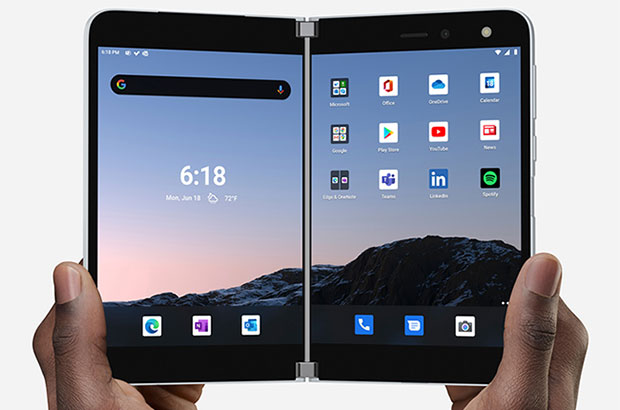I’ve been using the Microsoft Surface Duo for over a week now, and it is my new favorite smartphone.
Optimized more for business than for consumer use, it isn’t for everyone. But for the way I use my smartphone, it is a better device for me. Let me walk you through why, and we’ll close with my product of the week — the new Nvidia RTX 30 card that may make you look better on your next Zoom call.
Spinning Back to a Business Focus
I was one of the last BlackBerry users and only recently gave up the latest BlackBerry phone because it was just too far out of date. While I’m still missing the keyboard a bit, what I really miss is the business focus of the device.
When the market pivoted from phones like the Palm, Microsoft, and Research In Motion (BlackBerry) devices to Android and iOS devices, we lost something. Mostly we lost a lot of time. We should have been focusing on work instead of distractions, and while streamed content is fun, it tends to consume our resources, i.e. time and money. At the same time, the old business standard arguably was more focused on helping us make more money and advance in our careers.
To me, and I realize that I’m not in the majority here, it is more important to focus on increasing my income and productivity than it is to focus on increasing my distractions and eating up both my free and work time.
I think Microsoft had it right when they ran this ad campaign for their old Microsoft phone, arguing that folks should take their nose out of their phones and experience life:
For me, a phone should predominantly be a way to communicate, but we communicate far differently now, and the apps we use to communicate seem to prefer larger screens; that takes us to the Duo, which has twin screens and is very different from the foldable phones with which it will compete.
New Ways of Doing Things
The Microsoft Surface Duo is a very different phone, which means it has a learning curve. For instance, to use it as a phone, you need to flip it open, pivot the screen around to the back, and put the screen with the camera above it next to your ear (and this also automatically answers the phone).
This configuration makes the device much better when you are using earbuds or one of the few Android smartwatches, like the latest generation Diesel smartwatch. It runs Android with a Microsoft UI, and it does take some retraining. Learning the unique gestures makes it a ton more fun to use, but at first, it’s a little frustrating because it’s different.
Now, what this device is particularly good at is reading books, doing email, and Microsoft Teams calls. In all three cases, the foldable screen makes the device substantially more efficient.
For reading books: You get two pages (when you put it in two-page mode), which makes it feel pretty close to a small paperback.
For email: You get the list of messages on one screen and what is in the highlighted message on the other. This makes going through email far more efficient.
For Microsoft Teams: You get the video conference on one screen and another function on the other screen, like the chat window or PowerPoint, allowing you to work with the phone similarly to how you likely work with your personal computer.

The phone uses glass for its case, and it comes with rubber bumpers in the box: USE THEM. I didn’t. I dropped the phone and cracked the case. It still works fine, and the rubber bumper covers most of the crack, but I wish I’d put on the rubber bumpers before I started using the phone.
Applications work as they would on any phone, but you can tent this phone much as you can a convertible laptop and prop it on your desk or table to watch a video, so you don’t have to hold the phone. Unlike a foldable phone, however, doing a video using both screens is annoying because of the break in the middle. I’m ok with this, but some may want a larger screen experience.
Surface Duo comes with 128 or 256 GB, and the difference in price is US$100, so I’d go with the extra storage for the money. The base price is $1,399, so this isn’t a cheap date, and I’d suggest you play with one for a bit before picking it up. Also, this is a Generation 1 product, so if you don’t like being an early adopter, you may be better off waiting for the Generation 2 or 3 version — and the next generation should have 5G and Wi-Fi 6.
The phone doesn’t have wireless charging, which I do miss a little, and it doesn’t have 5G or Wi-Fi 6, but given 5G isn’t deployed yet where I live, and it is a phone, I’m not missing the shortcoming, but I might if 5G was available. My laptop is Wi-Fi 6, and I need it for larger files, but picture uploads are fast with Wi-Fi 5, and this Duo does support 4×4 MIMO. It has a decent camera, and rather than switching from the front camera to the back, you fold the screen over to take a picture or leave it in book form to take a selfie.
But I love the thing, and it is my new favorite phone.
Wrapping Up: Why This Phone Fits Me
I’m a reader. I read a lot of books. I don’t play video games on my phone. I have PCs and game systems for that, and I’m used to using a headset, my watch, or earbuds for calls.
As a book reader, the Surface Duo is incredible. Outlook on the phone is similar to the experience on my laptop. I typically carry a phone and a tablet, and I’ve found that now with this Surface Duo, I’m down to carrying only the phone. I even read with it in bed at night and only go to the tablet if my charge starts running low.
This form factor also fits how I’m using the phone at home, mostly to stay connected when I’m away from my desk and to read when I have some downtime. It resides in my back pocket, so I always have it with me, and if I have to run an errand or go someplace where I have to wait (like to pick up dinner), I have my best reader in hand.
The Surface Duo phone is worth checking out, and for people like me, it may be worth it. However, once again, it is a first-generation device, and it will likely change a lot over the next two generations. So for those that like something a bit more cooked, you’ll want to wait for Generation 2 or 3. But for me, Generation 1 is where I live, and, as an analyst, pain is my middle name.
Seriously, I’m having a ton of fun with this phone and if you are a heavy ebook reader, this could be just the phone for you. It is for me.
The Nvidia RTX 30 series has pushed the graphics envelope significantly, but, as I mentioned last week, the significant advantage is that it significantly enhances other things you need to do while working from home.
Nvidia Broadcast allows you to create a much better video image of yourself. Virtual backgrounds look more real, active noise cancellation virtually eliminates background noise, and you can dynamically place your image inside the content you are sharing.
All of this makes you present better to the folks you are virtually meeting with, and that can make a huge difference. This week I was doing a call with a VP, and he was having all kinds of video and sound issues that this card could have mitigated. Granted, right now, this is a desktop PC-only solution, but I find I live on my desktop PC when I’m working from home.
I continue to think that this is the new battleground for graphics, and Qualcomm and Intel are on the same page concerning providing enhancements. But I love it when an OEM thinks out of the box and starts working on problems that are outside of their standard field.
Nvidia is all about graphics performance, and this new card line should be stunning for that.

Not everyone games, but right now, most of us are meeting online, and improving that experience is likely far higher on our needs list than better game play. Though I should mention that these new cards also reduce latency significantly, so for those of you who are gamers and like first-person shooters, this could be your ticket to more wins.
In any case, I use a desktop computer, and I live on video calls right now. This card family hits me where I live — which makes the Nvidia RTX 30 Series my product of the week.
























































